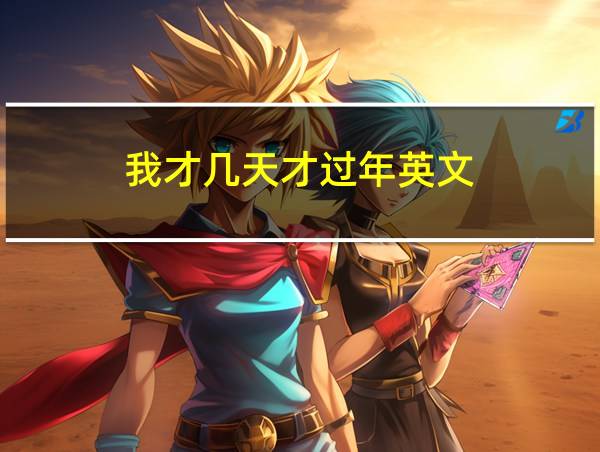我才几天才过年英文

什么时候过年的英文
The English translation of \"什么时候过年\" is \"When is the Spring Festival? When is the Chinese New Year?\"
英语作文 My Spring Festival (春节) 50个单词左右
During this year\'s Spring Festival, I had a delightful time celebrating with my family. On New Year\'s Eve, we gathered together and enjoyed a scrumptious feast. The atmosphere was filled with laughter and joy as we exchanged gifts and shared stories. The streets were adorned with colorful decorations, and people were bustling about, spreading the festive spirit. The highlight of the festival was the traditional lion dance performance, which left everyone mesmerized. It was truly a memorable and heartwarming experience.
春节的日期用英语怎么?
The English translation of \"春节的日期\" is \"The date of the Spring Festival\" or \"the date of Spring Festival\".
新年是 New Year\'s Day 还是 Spring Festival?
The Spring Festival refers to the traditional Chinese New Year celebration. On the other hand, New Year\'s Day usually refers to the first day of the year according to the Gregorian calendar. So, when saying \"新年快乐\" in English, it can be translated as \"Happy New Year\" or \"Happy Spring Festival\" depending on the context. It\'s important to note that different cultures and countries have their own ways of celebrating the new year, and these terms may vary.
1、没什么.2、马上要过年了.怎么用英语翻译?
1. The English translation of \"没什么\" is \"nothing at all\". 2. The English translation of \"马上要过年了\" is \"New Year is coming soon\" or \"New Year is just around the corner\". The latter phrase adds a touch of literary elegance to the expression.
春节是几月几日英语
The Spring Festival, also known as the Chinese New Year, does not have a fixed date according to the Gregorian calendar. It usually falls between January 21st and February 20th. The exact date varies each year as it is determined by the lunar calendar. The Spring Festival is an ancient tradition that has evolved from the ancient ritual of praying for a good harvest at the beginning of the year.
请各位回答是说明理由,我们老师都拿不准,不要误人子弟哦。
When referring to the specific date of the Spring Festival, it is more appropriate to use \"on\". For example, \"on the evening of New Year\'s Day\" or \"on February 12th\". However, when talking about a general time period, such as \"during the Spring Festival\" or \"in the evening of the New Year\", it is more fitting to use \"in\". The choice between \"on\" and \"in\" depends on the context and the specificity of the statement.
在春节英语用 in 还是 on?
When speaking about a specific date or time, it is more appropriate to use \"on\". For example, \"on New Year\'s Eve\" or \"on February 12th\". On the other hand, when referring to a general time period or duration, such as \"in the morning\" or \"in the evening\", it is more fitting to use \"in\". The choice between \"on\" and \"in\" depends on the context and the specific usage.
英语翻译过新年了!在新的一年里,我有一个新的目标.1.我要让...
The English translation of \"过新年了\" is \"New Year has arrived!\". In the new year, I have set a new goal for myself. Firstly, I will strive to improve my proficiency in both Chinese and English languages. By dedicating more time to studying and practicing, I aim to enhance my communication skills and broaden my cultural understanding. Secondly, I have made a resolution to wake up early every morning and seize the day with enthusiasm and positivity. This will not only boost my productivity but also instill a sense of discipline and routine. Lastly, I will focus on maintaining a healthy lifestyle by exercising regularly and eating nutritious meals. These resolutions will contribute to my personal growth and well-being throughout the new year.
英语翻译新的一年来到了.今天是新年的第一天.早上,我要去看...
The English translation of \"新的一年来到了\" is \"The new year has come\". Today marks the first day of the new year. In the morning, I will go to see the sunrise with my loved ones and cherish the beautiful beginning of this auspicious year. The air is filled with a sense of renewal and anticipation, as we leave behind the old and embrace the new. It is a time for reflection, gratitude, and setting new intentions. This morning ritual symbolizes hope and optimism for the year ahead, and it sets the tone for a fresh start filled with endless possibilities.


